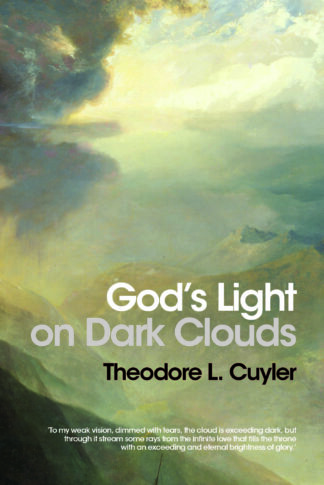God’s Light on Dark Clouds – A Review by Hugh Cartwright
This work was first published in 1882 by Dr Cuyler (1822-1909), who studied at Princeton Seminary during its ‘golden age’ in the 1840s when Archibald Alexander, Samuel Miller, Charles Hodge, and J A Alexander were professors (see Princeton Seminary, David B Calhoun).
Graduating in 1846 he entered in 1860 on his last and longest charge as a Presbyterian minister in Brooklyn, New York. Cuyler was only four when his father died, and he and his wife lost two infant children. This book was written by the heavy-hearted father a few months after the death of a daughter at 21 years of age. Its dedication reads: ‘To the desponding and bereaved these words of sympathy and cheer are lovingly inscribed’. It could have been inscribed with the words of Paul in 2 Corinthians 1:3,4: ‘Blessed be God, even the Father of our Lord Jesus Christ, the Father of mercies, and the God of all comfort; who comforteth us in all our tribulation, that we may be able to comfort them which are in any trouble, by the comfort wherewith we ourselves are comforted of God’.
Cuyler draws on the experience of himself and others of God’s sufficient grace and upon the streams of consolation running through the Scriptures to enforce in 22 short and beautifully-simple chapters such basic but needful lessons as: ‘Faith carries present loads and meets present assaults and feeds on present promises, and commits the future to a faithful God’ (p 20); ‘One great purpose in all afflictions is to bring us down to the everlasting arms’ (pp 53, 86); faith ‘is simply the linking of our utter weakness to the omnipotence of Christ’ (p 85); and ‘God often strikes away our props to bring us down upon his mighty arms’ (p 86).
An occasional expression, reference to ‘Easter Sabbaths’ and ‘Christmas bells’, allusion to Finney (whose theology and methods Hodge opposed though he respected the man), and the knowledge of his intimate friendship with D L Moody (which he shared with Spurgeon and many of the leading Free Church men of the time), make us wonder if Cuyler had lost some of the early Princeton influence, but not having read any of his many other works we cannot make a fair assessment. Certainly this book can be commended as a very helpful contribution to the accomplishment of its aim and will make a suitable gift for anyone who, for any reason, is passing through a time of trial or sadness. It is a book which someone who cannot settle to read something lengthy and more dense can take up and read from time to time. It has the great merit of having something to say and the ability to say it in a way which is none the less profound for being stated simply, sympathetically and with a measure of helpful repetitiveness.
Notes

price From: £4.80Description
This work was first published in 1882 by Dr Cuyler (1822-1909), who studied at Princeton Seminary during its ‘golden age’ in the 1840s when Archibald Alexander, Samuel Miller, Charles Hodge, and J A Alexander were professors (see Princeton Seminary, David B Calhoun). Graduating in 1846 he entered in 1860 on his last and longest charge […]
Rev Hugh M Cartwright is pastor of the Edinburgh congregation of the Free Presbyterian Church of Scotland. This review was first printed in the September 2009 edition of the Free Presbyterian Magazine and is reproduced here with kind permission.
Latest Articles
Finished!: A Message for Easter 28 March 2024
Think about someone being selected and sent to do an especially difficult job. Some major crisis has arisen, or some massive problem needs to be tackled, and it requires the knowledge, the experience, the skill-set, the leadership that they so remarkably possess. It was like that with Jesus. Entrusted to him by God the Father […]
Every Christian a Publisher! 27 February 2024
The following article appeared in Issue 291 of the Banner Magazine, dated December 1987. ‘The Lord gave the word; great was the company of those that published it’ (Psalm 68.11) THE NEED FOR TRUTH I would like to speak to you today about the importance of the use of literature in the church, for evangelism, […]
